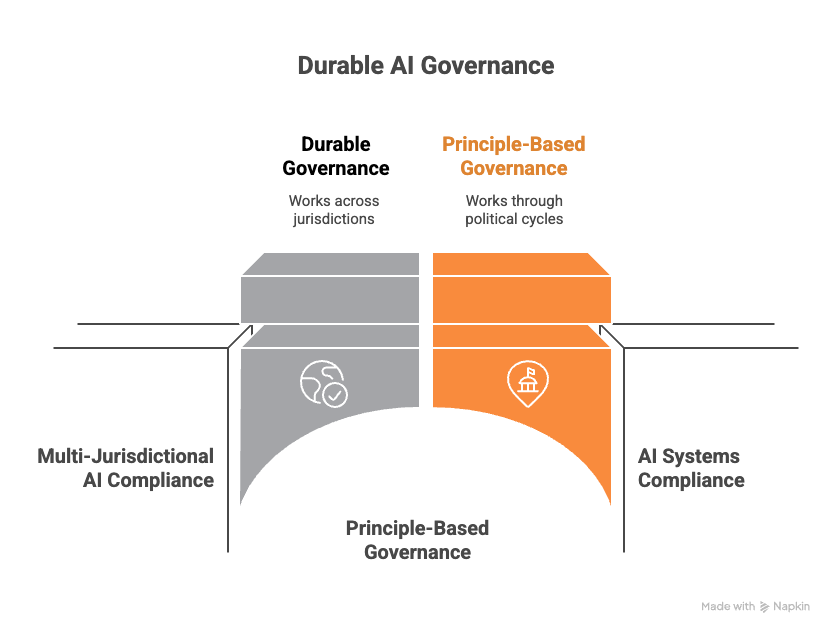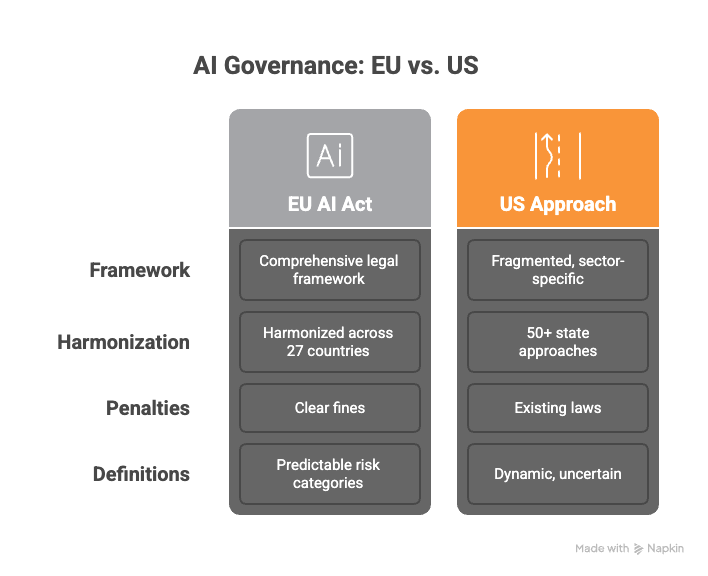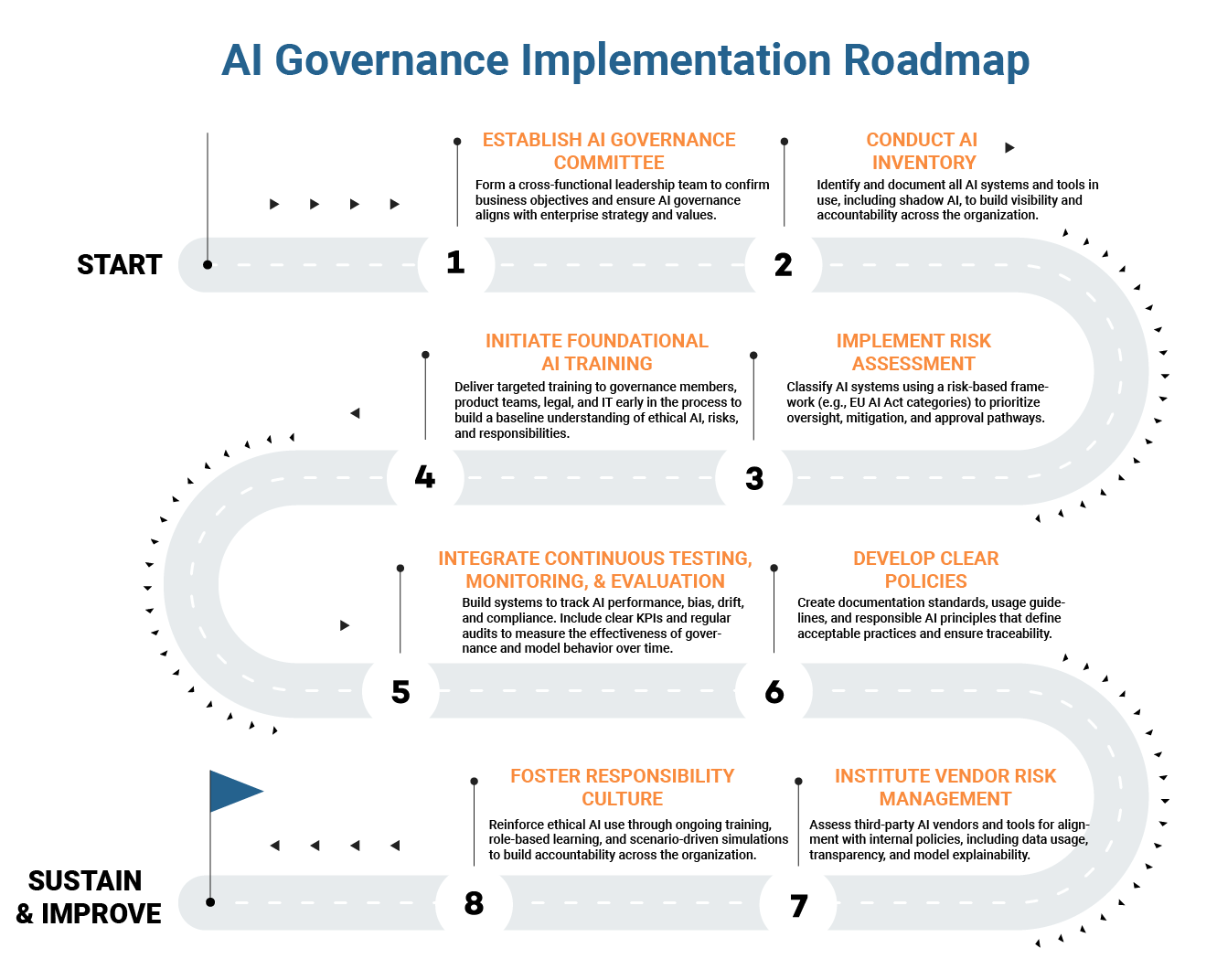The U.S. AI regulatory landscape is complex, rapidly evolving, and politically volatile. AI compliance can’t wait for Washington to “figure it out.” It must be designed, operationalized, and sustained within your organization—now.
Companies across Omaha, Council Bluffs, and the broader Midwest are facing increasing pressure to adopt responsible AI practices that comply with evolving federal and state laws. This post provides a practical guide for Midwest leaders to navigate regulatory changes, meet enforcement realities, and implement an AI Compliance Implementation Roadmap that remains effective through political cycles.
Why AI Compliance Matters Right Now
Recent shifts in US federal direction (e.g., Executive Order 14179 in January 2025 reversing prior federal AI policy), paired with the Senate’s rejection of a moratorium on state AI regulation, signal something critical:
Multi-jurisdictional AI compliance is no longer a temporary pain—it’s a permanent operating condition.
- 45+ states proposed ~700 AI bills in 2024
- Each is taking its own approach (consumer rights, duty of care, targeted bans, biometric protections, etc.)
- Federal agencies (FTC, EEOC, CFPB, DOJ) are already enforcing AI harms using existing authorities
Bottom line: Your organization needs durable, principle-based governance that works across jurisdictions and through political cycles.
If you’re operating in the Midwest, especially in Nebraska or Iowa, your AI systems could soon be subject to overlapping rules, class-action risks, or compliance audits.

Two Worlds of AI Governance: EU vs. US
EU AI Act – “The Fortress”
- Centralized, comprehensive legal framework
- Harmonized across 27 member countries of the European Union
- Clear fines (e.g., up to €35M or 7% of global revenue)
- Predictable definitions and categories of risk
US – “The Frontier”
- Fragmented, sector-specific, and state-driven
- Enforcement via existing laws (consumer protection, discrimination, privacy)
- 50+ different state approaches
- Dynamic, uncertain, and fast-changing
Implication for compliance teams in Omaha and beyond: In the US, you can’t “just follow the law.” You need a principle-based AI governance system that synthesizes best practices from all directions and adapts continuously.
The American AI Challenge

1) Federal Vacuum
There’s no comprehensive federal AI law. That creates ambiguity—but not safety. Agencies will still come for you if your AI harms consumers or discriminates.
2) State Innovation
- Colorado SB 24-205: Duty of reasonable care for high-risk AI
- California CCPA/CPRA: Automated decision-making transparency & consumer rights
- Texas TRAIGA: Targeted prohibitions, innovation sandboxes, and advisory councils
- Illinois BIPA: Biometric privacy with private right of action (hello class-action risk)
3) Business Reality
Your compliance posture must handle simultaneous, non-harmonized obligations. That requires:
- Inventories of AI use
- Risk assessment frameworks
- Documentation discipline
- Monitoring, evaluation, and continuous improvement
This is especially important for Midwest companies working with both regional customers and national vendors.
Regional Overview Table
| State | Enacted Laws | Proposed AI Legislation |
|---|---|---|
| Nebraska | Minors’ protection (social media, AI-generated child porn) | High-risk disclosure (LB 642), stalled campaign-ad rules (LB 1203) |
| Iowa | None | Election-related AI disclosures (HSB 294) |
| Kansas | None | No active AI proposals |
| Missouri | None | Political ad disclaimers & liability concepts pending |
| Minnesota | None | Disclosures for customer AI interactions (SF 1886), political ad labeling (SB 2642) |
| Colorado | Duty of care for high-risk AI (SB 24-205) | N/A – comprehensive bill enacted |
| South Dakota | None | No known AI legislation introduced |
Key Takeaways for Midwest Organizations
- No comprehensive AI governance laws in most of this region yet—they’re still in legislative draft phase.
- Colorado stands out as the only nearby state with a formal AI law requiring duty of care for high-risk systems.
- Disclosure and transparency are the earliest and most common proposals (e.g., election content, customer chatbots).
- Nebraska aligns toward high-risk AI consumer disclosures (LB 642) but broader rules remain uncertain.
- Kansas, Missouri, and South Dakota are cautious and slower, with no concrete regulation enacted.
- If your org operates in Omaha / Council Bluffs or the surrounding region, focus on AI use cases involving consumer decisions, chatbot deployments, and political advertising tools.
Implementation Lessons from the States
- Risk-Based Assessment (Colorado): Classify systems by risk and scale controls accordingly
- Consumer Transparency (California): Provide notices, explanations, and rights to opt-out or appeal
- Targeted Prohibitions (Texas): Know what you should never do
- Consent Mechanisms (Illinois BIPA): Treat biometrics and sensitive data with maximum care
Strategy: Don’t pick a single state model. Synthesize the best ideas into a durable, principle-anchored governance framework that can flex as laws evolve.
Your AI Compliance Implementation Roadmap (8 Steps)
This roadmap is designed to operate in the US Frontier while staying compatible with EU-style risk frameworks. It’s particularly suited to Midwest-based companies that want to act with clarity and confidence before regulators knock.

Final Word
In the US, AI compliance isn’t a single law to follow—it’s a practice to master.
Regulations will keep shifting. Enforcement will keep expanding. States will keep diverging.
Organizations that win won’t be those waiting for certainty. They’ll be the ones who build resilient, principle-led AI governance now—and continue to sustain and improve it.
Need Help With AI Governance in Omaha or the Midwest?
If your organization is based anywhere across the Midwest, we can help. One80Labs specializes in:
- AI compliance and governance training
- Risk classification and model assessments
- Shadow AI audits and vendor evaluations
Contact us to schedule a consultation or learn how to implement your AI roadmap: hello@one80labs.com
Let’s make sure your organization leads with trust, clarity, and confidence.
